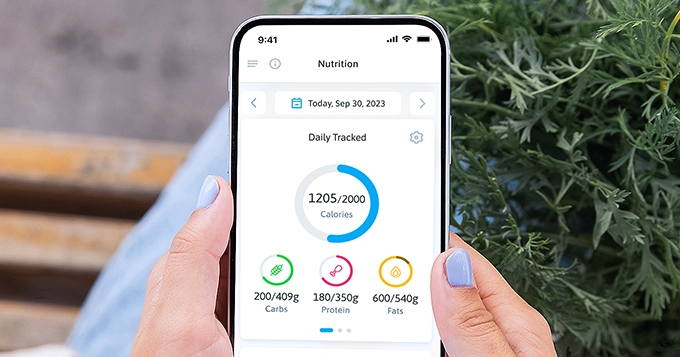Who doesn’t want to have a healthy lifestyle?
But it’s not the easiest, especially if you don’t know where to start.
In this article, we’ll unravel what could be the reasons why you keep making unhealthy choices and what dietary adjustments you can make to finally start living a healthy lifestyle.
Why Is It Hard to Stick to a Healthy Lifestyle?
- Instant gratification
Instant gratification is a feeling of pleasure or satisfaction from doing something without having to wait for a delayed reward. And most of the time, we reward ourselves with foods that are usually not-so-healthy.
Because of technology, it’s easier to get what you want right away, such as ordering takeout with just a few taps on your phone.
Just to be clear, there is nothing wrong with indulging occasionally. However, instant gratification can become a problem when you start to expect it every time.
This instant gratification can often be addictive, making it hard to have a healthy lifestyle.
For example, you’re used to getting what you want instantly. When you start going to the gym to achieve your fitness goals but aren’t seeing immediate changes, you can be frustrated, anxious, impatient, and sad.
Thus, the next time you find yourself inclined to pursue instant gratification, stop, consider the bigger picture, and decide whether it’s truly worth it in the long term. By dealing with this, you can achieve long-term goals while maintaining balance in your life.
- Changing too much too quickly
Many times, people try to change everything in their lives all at once—like giving up sugar, carbs, meat, or gluten or committing to daily gym workouts.
But here’s the catch: studies show that 67% of adults find it hard to stick to these big changes! So, instead of going all-in, try setting smaller, more doable goals. This way, you can slowly get used to a healthier lifestyle without feeling overwhelmed.
- Bad habits are hard to break.
Studies indicate that it typically takes around 66 days to adapt to new behavior, such as a dietary change, a longer period than most people try before giving up. So, if you’re aiming to break bad habits, stick with those moderate goals you’ve set for at least two or three months. This duration helps solidify these changes, making them a natural part of your routine.
- Lack of accountability
Making significant lifestyle changes on your own, without the help of friends or family, can be a very challenging endeavor to follow through on. If you think you need more accountability, consider creating a resolution with a friend who has similar goals so you can support and encourage one another!
Dietary Adjustments for a Healthy Lifestyle
Eat a diet rich in whole foods
Making small dietary changes, such as incorporating more fruits, grains, protein, and vegetables into your meals, can have a significant impact on your overall well-being.
Whole foods contain vitamins, minerals, fiber, and phytonutrients, all of which play an essential role in promoting a healthy gut and lowering your risk of chronic diseases such as diabetes and obesity.
Contrary to popular belief, eating healthily does not actually have to be expensive. Check out this article: How To Lower Grocery Bill But Keep It Healthy
Limit processed foods and added sugar
Implementing diet modifications focused on reducing processed foods and minimizing added sugar has proven effective in promoting a healthier lifestyle.
Convenient as they may be, processed foods and foods with a lot of added sugar frequently lack vital nutrients and might worsen health problems. When possible, choose whole, unprocessed meals. If you’re craving something sweet, go for natural sweeteners like maple syrup or honey; they’re better options, but it is still important to consume them moderately.
Control your portions
Monitoring portion sizes can help you control your weight and prevent overeating. To cut back on extra calories, use smaller plates and pay attention to portion sizes. This little tweak can have a major influence on your overall health.
Mindful eating
Sometimes, we eat on the go, not really thinking about what or how much food we consume.
Chew your food slowly, enjoy every bite, and pay attention to your body’s signals of hunger and fullness by eating mindfully. This makes eating more enjoyable and less likely to result in overeating.
Keep filling snacks on hand
We often forget about our healthy eating goals for the day when we are really hungry and tempted by a delicious treat.
While occasional food cravings are perfectly normal, studies have shown that our cravings tend to intensify during periods of extreme hunger.
Having nutritious and satisfying snacks (high in protein and fiber) on hand, you are less likely to stray from your diet when the cravings hit.
Some healthy snacks include:
- fresh fruits and veggies
- yogurt
- plain popcorn
- hard-boiled eggs
- mixed nuts and nut butters
- hummus or roasted chickpeas
- whole grain crackers
Plan your meals
Achieving a healthier diet often requires careful planning and preparation. Allocate some time to strategize your meals and snacks for the upcoming week, and endeavor to prepare as much as possible. This approach enables you to make more mindful food choices and minimizes the likelihood of succumbing to less nutritious convenience options.
Plan ahead before eating out
Meals from restaurants generally contain elevated levels of calories, sodium, sugar, fat, and ultra-processed ingredients compared to home-cooked meals. Additionally, restaurant portions tend to be larger in size.
Planning ahead before dining out is an excellent strategy to remove any stress or uncertainty associated with sticking to your healthy diet.
Here are some tips:
- Check out the menu in advance.
- Eat a piece of fruit before you go to the restaurant.
- Stay hydrated while you eat.
- Order your own meal.
- Take your time and enjoy your meal.
Monitor your progress
Evaluate your progress to see if your efforts are achieving the desired outcomes. However, monitoring doesn’t necessarily entail meticulously logging every calorie in an app. Simply tuning in with your body can be sufficient to support your commitment to a wholesome diet.
To gauge the effectiveness of your healthier diet, consider asking yourself the following questions:
- Am I full and satisfied?
- Do I genuinely enjoy what I eat?
- Can I envision sustaining this eating pattern in the long run?
- How confident do I feel about my current diet?
- Have I observed any changes in my physical health?
- How is my mental health?
These questions can help you understand how your dietary choices impact both your satisfaction and well-being.












